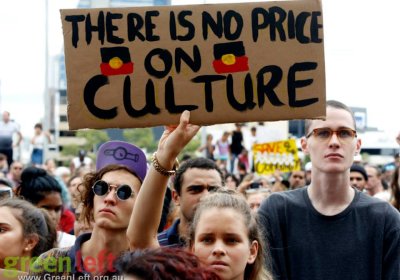 The far right Islamophobic “Reclaim Australia” movement burst onto the streets in what was the biggest racist mobilisation since the Cronulla riots, in 16 places across Australia on April 4. They were armed with swastika tattoos, Australian flags and a few simplistic slogans such as “No halal food”.
They were also met by counter protesters who stood up to reject racism, chauvinism and bigotry.
The far right Islamophobic “Reclaim Australia” movement burst onto the streets in what was the biggest racist mobilisation since the Cronulla riots, in 16 places across Australia on April 4. They were armed with swastika tattoos, Australian flags and a few simplistic slogans such as “No halal food”.
They were also met by counter protesters who stood up to reject racism, chauvinism and bigotry.
Alex Bainbridge
 The far right Islamophobic “Reclaim Australia” movement burst onto the streets in what was the biggest racist mobilisation since the Cronulla riots, in 16 places across Australia on April 4. They were armed with swastika tattoos, Australian flags and a few simplistic slogans such as “No halal food”.
They were also met by counter protesters who stood up to reject racism, chauvinism and bigotry.
The far right Islamophobic “Reclaim Australia” movement burst onto the streets in what was the biggest racist mobilisation since the Cronulla riots, in 16 places across Australia on April 4. They were armed with swastika tattoos, Australian flags and a few simplistic slogans such as “No halal food”.
They were also met by counter protesters who stood up to reject racism, chauvinism and bigotry.
Thousands of people rallied in cities and towns around Australia on March 19 in opposition to the planned closure of around 150 remote Aboriginal communities in Western Australia. The issue was thrust into the spotlight in September when the federal government — without consultation — announced that it would stop providing funding to these homeland communities from July 1 this year.
 An Aboriginal encampment returned to Matagarup (also known as Heirisson Island) on March 1. Police moved in on March 13 to close it down but were unsuccessful.
An Aboriginal encampment returned to Matagarup (also known as Heirisson Island) on March 1. Police moved in on March 13 to close it down but were unsuccessful.
Several commentators have pointed out that treasurer Joe Hockey's Intergenerational Report is a partisan document designed to bash Labor over the head.
Thousands of people threatening to hold a late night pyjama party at Perth train station have forced a backdown from the state government.
State transport minister Dean Nalder issued a media statement on March 3 promising that late night trains on Friday and Saturday evenings would remain.
Previously the Public Transport Authority had announced that the 1am and 2:15am train services would be cancelled.
The dramatic dumping of Campbell Newman’s Liberal National Party government in Queensland and the leadership spill against Abbott have starkly revealed the ongoing popular opposition to the Coalition's program of cutbacks and privatisation. It has thrown the federal Liberals into a crisis.
This is a tremendous boost for progressive people in Australia and the anti-Abbott campaign in particular.
"Today was the best Invasion Day protest that I have ever been to," Socialist Alliance councillor Sue Bolton told Green Left Weekly on January 26. "There was a real feeling of Aboriginal pride and resistance. The crowd was bigger today too."
In Melbourne, the protest began with a smoking ceremony near Parliament House followed by a rally on the parliament steps.
The rally then marched to the official "Australia Day" parade, moved the barricades and marched along the official parade route.
Aboriginal people and their supporters are converging in Canberra from all over Australia for the Invasion Day weekend. The weekend will feature a "sit-in" that is expected to release an historic Declaration of Independence reaffirming Aboriginal sovereignty in this country.
Aboriginal activists in Western Australia are gearing up for a rally on November 12 to protect remote communities in the face of federal government attacks. It will follow a September 16 rally against state government threats to Aboriginal heritage and an October 23 rally against ongoing Black deaths in custody.
The federal government announced on September 24 that it would withdraw funding for 180 remote Aboriginal communities in WA. It will grant $90 million to the WA government for a two-year “transition period”.
Prime Minister Tony Abbott has indicated his government plans to increase the Goods and Services Tax (GST).
Before last year’s election, Abbott promised the Australian people that “the GST won't change, full stop, end of story”. But on October 27, he called for a “mature debate” on the topic, making it clear his government intends to increase GST revenue.
More than 800 police carried out simultaneous raids on houses in Sydney and Brisbane on September 18. Fifteen people were detained as a result, but only two were charged.
The high profile police raid – coordinated with the media – has been described as the “nation’s biggest counter terrorism operation in history”. It comes one week before the government plans to bring anti-democratic “terror laws” to a vote in parliament and as troops are deployed for a new Iraq war.
Forty thousand people marched against the federal government and its budget in over 30 locations on the weekend of August 30-31. This was smaller than the three similar mobilisations in March, May and July, but shows there is still a strong community sentiment against the budget.
All campaigns have ups and downs — no grassroots movement ever grows continually upwards. The smaller numbers reflect the fact that the initial raw anger against the budget has passed. To maintain a campaign in this context, people need to have confidence that their efforts can bear fruit.
- Previous page
- Page 39
- Next page









